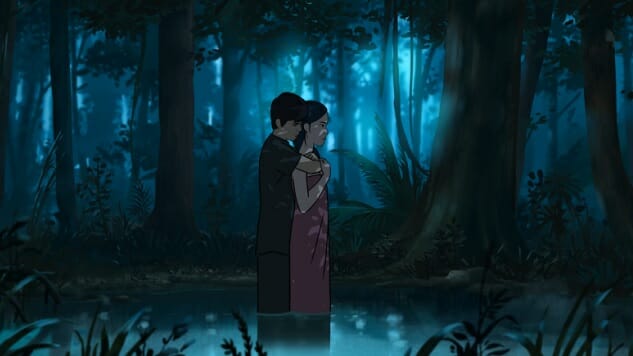When Isao Takahata got word of the Western response to Grave of the Fireflies after its 1989 US release, he rejected American critics’ joint reading of the film as anti-war. Takahata claimed his movie contained “no such message,” clarifying that he intended it as a story about life in social isolation. Rather than anti-war, it’s anti-ostracization.
Maybe when French-born Chinese-Cambodian filmmaker Denis Do’s tremendous debut feature, Funan, is met by Western gatekeepers and moviegoers, they’ll collectively dub it an anti-coup picture, and maybe Do will make similar dissent. Funan, as close to a contemporary Grave of the Fireflies as any animated movie can get, is considerably more personal for Do than even Grave of the Fireflies was for the late Takahata: It’s his story, a loose recreation of the suffering his family endured under the bootheels of Cambodia’s Khmer Rouge period, between 1975 and 1979, that snatched away the lives of nearly 2 million Cambodians. It’s damn near a miracle that Do is here today to tell this tale at all.
Bless him for doing it. Think of Funan as a companion piece to Angelina Jolie’s First They Killed My Father, her adaptation of Khmer Rouge survivor Loung Ung’s non-fiction account of her time as a child caught in the genocidal regime’s grip. Jolie and Ung co-wrote the screenplay; Do wrote Funan’s with help from Magali Pouzol and Elise Trinh. What Do lacks in Ung’s experience he makes up for as the artist at Funan’s helm. This is his vision, his gift of sorts to his mother, a survivor like Ung, and to the horrors she endured at the Khmer’s hands: a gorgeously animated and elegantly told tale of repressive autocratic rule, arriving at a moment when autocrats are increasingly becoming the fashion worldwide.
Funan rests most of the narrative on Chou’s (Bérénice Bejo) shoulders, as she, her husband Khuon (Louis Garrel) and their three-year-old son Sovanh, as well as Chou’s family—her brothers Meng (Brice Montagne) and Tuch (Tom Trouffier), sister Lili (Lila Lacombe), mother (Céline Ronté) and grandmother (Colette Kieffer)—all trudge over open roads and through mine-infested rivers. They’re driven by command of Khmer soldiers, black-clad, wrapped in red scarves, equipped with rifles and pistols and a strict zero tolerance policy for mercy. Early on, Sovanh is separated from the crowd. It’ll take the rest of the film’s running time before Chou and Khuon see him again, though Do lets the audience visit the kid as he acclimates to Khmer rule while still trying to be a kid.
Do keeps a sparse canvas, though his color palette pops. Bright natural shades lend the film a lush visual scheme, uncomplicated by details but vivid all the same. There’s a great deal of freedom gained through simple presentation. When Do’s characters react, whether in grief or terror or anger, their reactions have urgency and weight. Chou’s eyes go liquid with longing for Sovanh from scene to scene; when she lambastes Khuon for losing him, the animation team’s impression of humanity almost feels more real than a live action depiction of the same scene might.
Animating Funan’s events gives Do and his crew a sense of separation. They’re removed from the subjects by medium. At the same time, they enjoy increased intimacy through the sway they have over what happens on the screen. The combined effect is to render Funan hyper-specific, a film unique to Do’s point of view. He shies away from overt depictions of violence, torture and rape—in fact the most graphic bloodshed occurs in the final ten or so minutes—and instead pushes these atrocities out of sight, where his protagonists can’t see them. They don’t need to. Neither does the viewer. It’s just basic addition to figure out what happens when, for instance, a Khmer child soldier holds a burning cigarette over a fallen prisoner, or when a Khmer leader locks himself in a hut with Lili before the camera cuts away.
It’s such rank ugliness that makes Funan’s beauty that much more appreciable. Do could be accused of glossing over the Khmer’s brutality; Jolie could be praised for taking an uncompromised glance at what happened to innocent Cambodians during the same period. But Do, through animation, invests viewers in his characters and in their plight. He’s able to put us right into their perspectives, to see these evils as they may have seen them, and all without sacrificing his aesthetics or neglecting the purpose of the exercise. Funan ends with a dedication to his mother, brother and half a million Cambodian exiles—more victims of the Khmer agenda—but the movie’s a rattling tribute to their suffering throughout, brilliant to behold and sobering to confront.
Director: Denis Do
Writers: Denis Do, Magali Pouzol, Elise Trinh
Starring: Bérénice Bejo, Louis Garrel, Colette Kieffer, Aude-Laurence Clermont Biver, Brice Montagne, Hervé Sogne, Thierry Jahn, Lila Lacombe, Céline Ronté, Tom Trouffier
Release Date: June 7, 2019 (NYC); June 14, 2019 (LA)
Boston-based culture writer Andy Crump has been writing about film and television online since 2009 (and music since 2018). You can follow him on Twitter and find his collected writing at his personal blog. He is composed of roughly 65% craft beer.
